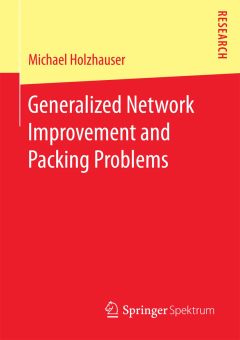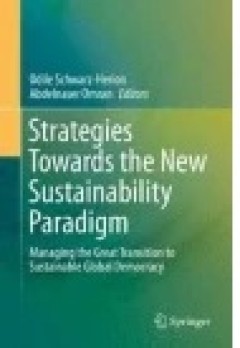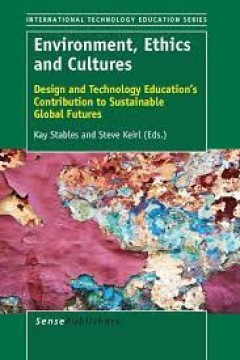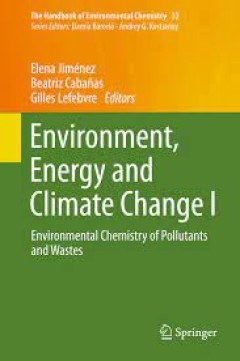Filter by

A History of Digital Currency in the United States: New Technology in an Unre…
This book presents detailed case studies of the first commercial internet digital currency systems developed between 1996 and 2004. Transactions completed with the new technology circumvented all US financial regulations, an opening that transnational criminals exploited. Mullan explains how an entire industry of companies, agents, and participants turned a blind eye to crimes being committed i…
- Edition
- Ed. 1
- ISBN/ISSN
- 978-1-137-56870-0
- Collation
- -
- Series Title
- Palgrave Advances in the Economics of Innovation and Technology
- Call Number
- 330 MUL h

Generalized Network Improvement and Packing Problems
Dr. Michael Holzhauser studied computer science at the University of Kaiserslautern and is now a research fellow in the Optimization Research Group at the Department of Mathematics of the University of Kaiserslautern.
- Edition
- -
- ISBN/ISSN
- 978-94-007-7695-1
- Collation
- XVI, 213
- Series Title
- -
- Call Number
- 519.282 MIC g

Interior Design: Conceptual Basis
This work is subject to copyright. All rights are reserved by the Publisher, whether the whole or part of the material is concerned, specifically the rights of translation, reprinting, reuse of illustrations, recitation, broadcasting, reproduction on microfilms or in any other physical way, and transmission or information storage and retrieval, electronic adaptation, computer software, or by…
- Edition
- -
- ISBN/ISSN
- 978-3-319-16474-8
- Collation
- -
- Series Title
- -
- Call Number
- -

A History of Chinese Science and Technology: Volume 1
A History of Chinese Science and Technology (Volumes 1, 2 & 3) presents 44 individual lectures, beginning with Ancient Chinese Science and Technology in the Process of Human Civilizations and an Overview of Chinese Science and Technology, and continuing with in-depth discussions of several issues in the History of Science and the Needham Puzzle, interspersed with topics on Astronomy, Arithmetic…
- Edition
- Ed. 1
- ISBN/ISSN
- 978-3-662-44257-9
- Collation
- -
- Series Title
- -
- Call Number
- 501 HIS h

Environmental Analysis by Electrochemical Sensors and Biosensors Applications
This book discusses in detail the analysis and monitoring of the most important analytes in the environmental field. It also reviews the implementation, realization and application of sensor designs mentioned in the first volume of this set, dividing the coverage into global parameters, sensors of organics and sensors of inorganics.
- Edition
- -
- ISBN/ISSN
- 978-1-4939-1301-5
- Collation
- 65 b/w illustrations, 28 illustrations in colour
- Series Title
- -
- Call Number
- -

Strategies Towards the New Sustainability Paradigm
Part I offers an overview of the six scenarios developed by the GSG and a short discussion of significant papers published by the Great Transition Initiative (GTI) of the Tellus Institute. Next come examples of dramatic historical and current transitions in Western Europe, the USA, Eastern Europe, the Middle East (Arabian Spring), and Asia, as well as an analysis of the potential of humankind t…
- Edition
- -
- ISBN/ISSN
- 978-3-319-14699-7
- Collation
- -
- Series Title
- -
- Call Number
- -

Intergovernmental Fiscal Relations: Questions of Accountability and Autonomy
This work is subject to copyright. All rights are reserved by the Publisher, whether the whole or part of the material is concerned, specifically the rights of translation, reprinting, reuse of illustrations, recitation, broadcasting, reproduction on microfilms or in any other physical way, and transmission or information storage and retrieval, electronic adaptation, computer software, or by…
- Edition
- -
- ISBN/ISSN
- 978-3-319-06296-9
- Collation
- -
- Series Title
- -
- Call Number
- -

Environment, Ethics and Cultures Design and Technology Education’s Contrib…
"This collection engages environmental, ethical and cultural values perspectives to show how Design and Technology (D&T) Education actively contributes to the significant educational goal of attaining sustainable global futures. An international collection of authors representing all levels of education articulate how D&T research, curriculum theory, policy, and classroom practices can synergis…
- Edition
- -
- ISBN/ISSN
- 978-94-6209-938-8
- Collation
- VI, 326
- Series Title
- -
- Call Number
- -

A History of Chinese Science and Technology: Volume 2
A History of Chinese Science and Technology (Volumes 1, 2 & 3) presents 44 individual lectures, beginning with Ancient Chinese Science and Technology in the Process of Human Civilizations and an Overview of Chinese Science and Technology, and continuing with in-depth discussions of several issues in the History of Science and the Needham Puzzle, interspersed with topics on Astronomy, Arithmetic…
- Edition
- Ed. 1
- ISBN/ISSN
- 978-3-662-44166-4
- Collation
- -
- Series Title
- -
- Call Number
- 501 HIS h

Environment, Energy and Climate Change I Environmental Chemistry of Pollutan…
This volume offers a comprehensive overview of advanced research in the field of environmental green chemistry for air, soil and water pollutants, and presents emerging technologies on the chemical treatment of polluted sites and wastes. The 15 chapters, prepared by internationally respected experts, address the following topics: (1) monitoring of indoor and outdoor air pollutants; (2) atmosphe…
- Edition
- -
- ISBN/ISSN
- 978-3-319-12907-5
- Collation
- 6 b/w illustrations, 44 illustrations in colour
- Series Title
- -
- Call Number
- -
 Computer Science, Information & General Works
Computer Science, Information & General Works  Philosophy & Psychology
Philosophy & Psychology  Religion
Religion  Social Sciences
Social Sciences  Language
Language  Pure Science
Pure Science  Applied Sciences
Applied Sciences  Art & Recreation
Art & Recreation  Literature
Literature  History & Geography
History & Geography